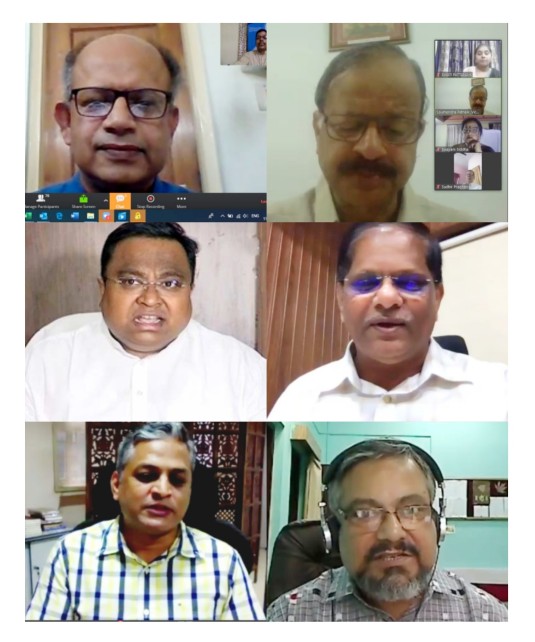Online education should complement, not replace classroom teaching: Experts
New Delhi: The forced shift to online education during the pandemic is a blessing in disguise, as it can push the boundaries of the current educational system.The
first challenge to overcome is the questionof equitable access to online education, especially in a state like Odisha, said educationists and policymakers Online education and classroom education are not alternatives, as both have their own strengths and weaknesses. The future lies in effectively combining the two to achieve things hitherto not imagines, in the entire education system. However, for a state like Odisha, access to infrastructure and end-user devices can be a challenge in making online education reach all sections of society, agreed experts in an online discussion forum, Leveraging Online Education in Odisha: Challenges & Opportunities, organized by The Intellects, a forum of progressive Odias in Delhi.
The forum, organized as part of The Intellects’ In-depth Odisha series saw participation of close to 100 educationists, teachers, students, parents, policymakers, and concerned citizens of Odisha, staying in and outside Odisha, including in outside India. Debendra Nath Rout, Chairman, The Intellects chaired and managed the entire program, lasting over three hours.
The first part of the program saw discussions on the topic by invited speakers—key personalities from the field of education, policymaking, public administration, and media. Opening the discussion, Dr Amar Pattnaik, Rajya Sabha MP from Odisha, stressed the need to look at online education as a long-term alternative and not just a stop-gap short-term reaction in the current situation. He proposed a 5E framework – Economy, Efficiency, Effectiveness, Equity and Ethics to evaluate the true value of online education as a viable, long-term education delivery mechanism.
Dr Sasmit Patra, Rajya Sabha MP and educationist looked at the issue from an educationist’s perspective. He said online education needs to be evaluated from a 6C framework of education delivery—capacity, communication, content, collaboration, connectivity and control. He said while online medium provides greater scope for collaboration, many questions, especially regarding capacity, content and control are still open for discussion.
While stressing that there is a need to revisit the definition of education and education delivery in the context of today’s reality, Prof. Soumendra Pattnaik, Vice Chancellor of Utkal University, said an educational institution needs four layers of institution building—physical, digital, intellectual and emotional—and said going forward, we have arrive at the right combination of all these. He apprised the joint effort by universities of Odisha to initiate a component of ‘self-study’ as 25% of the curriculum from the next semester, which will allow the students to take help of Internet and best-of-class prepared content shared with them to supplement the classroom teaching. While elaborating further on the ‘self-study’ concept agreed upon by the higher education fraternity in Odisha, Prof Ishan Patro, Vice Chancellor of Ravenshaw University, also emphasized on ensuring equitable access to education and appealed to explore how online can be exploited to achieve that objective. He also elaborated the components of education that are better delivered online, that are challenging to deliver online and that cannot be delivered online.
Manoj Mishra, Secretary, Electronics & IT, Government of Odisha, said by forcing online education, the pandemic has allowed us an opportunity to explore and discover how we can achieve more through making it an essential component of education delivery. There is an opportunity to bring those children that are outside schools because of certain constraints to the educational system leveraging online. Addressing the concerns about basic
access to online raised by speakers, he assured that all gram panchayats would be connected by optical fiber-based broadband by December 2021. He also announced that the government has created digital content for class IX and X students in Odisha which would be made available soon.
Prof Mrinal Chatterjee, Director, Indian Institute of Mass Communication, Dhenkanal, said those criticizing online education should realize that it is better than no education. Apprising that the institute has created a standard operating procedure for online delivery of education, he said online education needs a multi-dimensional push-and-pull approach, including improving public infrastructure, improving infrastructure at educational institutes, providing access to learners as well as creating a seamlessly blended online-offline model of teaching that is effective as well as cost-effective. This part of discussion was moderated by Shyamanuja Das, Secretary, The Intellects, who introduced the speakers and summarized their viewpoints. The second part saw enthusiastic participation of more than 30 stakeholders—students, teachers, educational administrators, from both higher and school education—who put forward their views, concerns, practices, suggestions and questions to the expert speakers from their own viewpoints.
While school children shared their constraints, challenges as well as best practices, teachers addressed the same issues from their side. Educational administrators who discussed the issue from a broader perspective suggested that the community should work together to take it forward. Many of them lauded the efforts of The Intellects in creating this platform. Among the eminent participants were Bidyadhar Rout, Controller at Allen
Career Institute; Narendra Kumar Roul, PrashikshanSanjoyak, Shiksha Vikas Samiti, which runs the Sishu Mandir schools; Prof. Netaji Upadhyay from OUAT; Sushant Kumar Mohapatra, Radha Nath Training College, Cuttack , Bidyadhar Behera from DAV College Titilagarh, Dr Jayshee Mohanty, Principal of Aspire Higher Secondary School, Bhubaneswar.
Prof Udaynath Sahoo, Sarala Das Odia Chair Profesor at Jawaharlal Nehru University, Delhi, summarized the discussion. The webinar was managed by Secretary Shyamanuja Das along with other members of The Intellects and technically supported by young brain Priyanshu Padhi and Aryan Rout.
“The response and the quality of contribution of all the participants were beyond our imagination. This shows how important is the issue of online education, its reach and its effectiveness, is to the community. It puts a great responsibility on The Intellects to carry forward the agenda through a continuous and collaborative approach involving the stakeholders, the government and the intellectuals,” said Debendra Nath Rout, Chairman, The Intellects.

